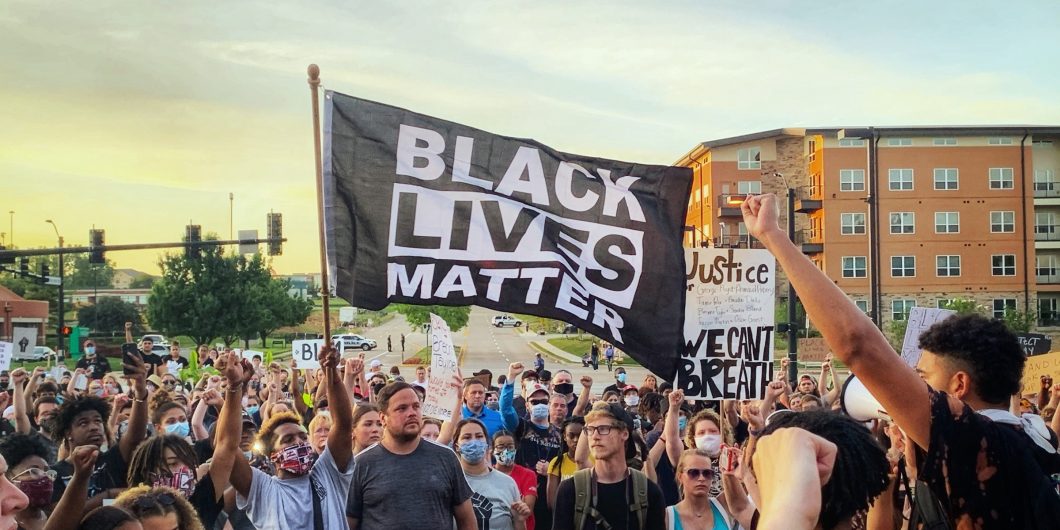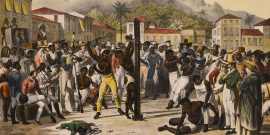Does "Race Obsession" Undermine the Left?
Kenan Malik is the archetype of an old-school antiracist. While the preface to Not So Black and White recounts his youthful epiphany that “a person’s skin, ethnicity or culture provides no guide to the validity of his beliefs,” the author’s own experience being non-white amounts to the book’s warmest endorsement. Malik’s journey to realizing the disconnect between race and truth appears conditioned from the get-go by his background. The Indian-born son of immigrants into 1970s crisis-struck Britain, he enlisted as a teen into antiracist neighborhood patrols and keeps no “mental tally” of the times he got into fights with “racists.” Having to pick one intellectual most incensed by the persistence of bigotry and ethnic discrimination in today’s West, Malik’s readers would likely choose him on par with the Kendis and DiAngelos of the world.
And yet Malik defies one unspoken rule of Anglo-American politics: that left-wing ethnic minorities are necessarily “woke,” as defined by the worldwide reaction to George Floyd’s death in police custody in 2020. The author clamors instead to “escape from the identitarian trap and uncage ourselves from our race obsession.” Malik is a man of the progressive left, mind you, but he is as thoroughly unwoke as he is repulsed by racism.
Part of why Malik falls on the unwoke side of today’s racial debates is his claim that racism has drastically retreated since the days of his street kerfuffles and community organizing in the 1970s, making wokeism unnecessarily bellicose. Interviewed recently by Coleman Hughes, Malik expanded on the point, arguing that Britain was a “much more racist country” at the time. This claim raises a couple of questions. If Britain was indeed such a bigoted society then, why was it seen as a haven of opportunity by millions from the country’s former colonies, not least Malik’s parents, who brought him from India when he was six? This also raises a question about the Labour Party, whose leaders are arguably part of Malik’s target audience and whose path to winning back the so-called “red wall” constituencies from the Tories lies emphatically not through bashing Britain’s past, particularly not a time period in which it was governed by Labour.
There’s another reason for Malik’s unwokeness. His book exudes nostalgia for the “universalist left” that cohered in the ’70s around the belief that social progress could be attained through multi-racial coalitions of activists not defined by their skin color. That left was a far cry from today’s identity politics, a kind of racial identitarianism that Malik defines as “stay on your lane.”
Though the book is ultimately framed as a rejoinder to identitarianism, Malik makes a circuitous detour into the history of race as a concept. He argues, counterintuitively, that the concept is not some arcane, timeless insight into man’s unchanging nature but rather a contingent product of modernity, correlated with the Enlightenment’s fidelity to the inherent equal worth of all human beings. The slavery example illuminates his reasoning. While it existed since time immemorial—not least in Europe under the Romans—slaves weren’t systematically reasoned to conform to one set racial category, ethnically diverse as they were. Black or white (mostly war bounty from various continents), most slaves were eventually freed without changing their ethnic categorization.
This is manifestly not what slavery evolved towards in modernity when it took on a much larger role with the discovery of the Americas. It wasn’t a role that Europeans created, however. Merchants found in the preexisting slave trade among African chiefdoms a fitting repository of manpower to colonize the New World. Those slaves weren’t bought and sold because their skin color was dark, Malik tells us. Instead, “they were eventually deemed to be racially distinct, as black people, to justify their enslavement.”
This paradox—“of modernity as the age that invented the concepts both of equality and of race”—forms the theoretical thrust of Malik’s book, eventually overshadowing his rather mundane prescriptions to combat racial identitarianism in practice. Malik is a trained neurobiologist with a master’s degree in the history of science who has carved out a beat for himself as a popular essayist. But peer-reviewed academics and thorough scholars would be wrong to dismiss the book out of hand, so deeply researched and conceptually provocative—in a good sense—it has come out to be.
Malik claims the Enlightenment, with its universalist belief in the freedom and equality of all human beings, kindled humanity’s hope that social progress would eventually erase differences among ethnic groups. The more radical Enlightenment thinkers—whom Malik hails as the answer to today’s ills—were even more off-base, thinking that races would eventually vanish through a mixture of intermarriage and assimilation. And yet the script required changes, when instead of vanishing, those differences hardened into place. “Intellectuals and elites,” writes Malik, “began dividing the world into distinct races to explain and justify the differential treatment of certain peoples.”
Working-class culture has largely disappeared along with trade unions of national scope, and Malik offers no prescriptions to revive it other than some vaguely-worded appeals to a “cross-racial working class.”
The birth of race as a concept, one learns after reading further into Malik’s thesis, was more like a two-step process than an instant inception. “18th-century philosophes sought to explain diversity,” he writes. “For 19th-century thinkers, diversity was the explanation.” This is rather like an axiomatic proposition underpinning Malik’s account, articulated with as much scholarly detail as possible and yet hard to test and challenge for its haziness. Malik impels us to invert the causal arrows between race and the differential treatment of people from different ethnicities. It’s not the latter that flows from the former but the inverse. “It isn’t racial differences that have led to unequal treatment but the persistence of inequalities in societies with a commitment to equality that has led many to view such inequalities as ineradicable, and hence natural, and to place people into different racial categories.” The gulf between the eighteenth-century framers of America’s Declaration of Independence—with its self-evident truth that “all men are created equal”—and nineteenth-century racialist thinkers—with all their crane-measuring racial hierarchies—seem an unbridgeable chasm, but Malik makes a compelling case that together they form a coherent system, with one pillar making the other more stable.
And here erupts Malik’s main concern as an old-school leftie and the source of his ultimate hope to see a post-racial society emerge: “Our preoccupation with race frequently hides the realities of injustice.” Whether to justify enslavement in the late 1800s or discriminatory hiring practices in the 2000s, modern capitalism throws up racial categories to hide, eclipse and obscure, to the benefit of the managerial class, the more evident chasm along class lines. “Racial divisions had, from the days of colonialism, been created as a means of fracturing the solidarity of people at the bottom of society, and of derailing political and economic opposition.” Malik lies at capitalism’s feet the preempting of multi-racial working-class coalitions, such as between black slaves and white indentured servants, whose racially alien identity to one another prevented them from seeing their common interests. These practices continue in the present, he claims. “Just as in the 19th-century racial identity was used to break up class alliances,” he writes in the end, “and to persuade white workers that their interests lay in whiteness and not in their class location, so today the language of identity leads to the same place, though without necessarily the conscious intention of doing so.”
Given the very resurgence of racial politics that Malik rightly identifies across the Anglosphere since 2020, it is no longer entirely clear that chalking up economic disparities to the determining factor of race is a less costly approach for the managerial class to follow than to simply let them be channeled through a class-based paradigm. When a major corporation or a federal employer hopes to whitewash a hiring policy that unjustly discriminates against African American applicants by merely claiming that such applicants don’t meet the employability criteria, the backlash to that policy and that message today may be far worse than it was, say, in the 1970s over the same practice carried out in the housing sector (redlining). At their core, Malik’s prescriptions hope to reenergize class warfare by redefining economic disparities as being primarily driven by class rather than by race, thus creating cross-racial coalitions of the working class to commonly defend shared interests. While this may appear like a convenient fix in theory, it would be much harder to carry out in practice. The lack of such a cross-racial front is also largely due to the disappearance of working-class culture, an aspect that Malik largely leaves out from his primarily political diagnosis. That culture has largely disappeared along with trade unions of national scope, and Malik offers no prescriptions to revive it other than some vaguely-worded appeals to a “cross-racial working class.”
Be that as it may, this racialization of class disparities, this severing of the “political from the economic,” has turned into a sticky equilibrium, worries Malik. As soon as policymakers timidly aim at alleviating social inequalities, those policies become racialized, perceived by the white working class as an affront to its interests merely because they happen to benefit mostly black recipients. As a result, “the more we despise racial thinking, the more we cling to it.” Malik’s answer to this conundrum is a politics of class-based solidarity beyond that rooted in racial identity.
Malik’s heroes are radical Enlightenment thinkers such as Frederik Douglass, CLR James, Frantz Fanon, and many others. “It was through the struggles of those denied equality and liberty by the elites that ideas of universalism were invested with meaning. And it is the demise of that radical universalist tradition that has shaped much of what we call identity politics.” On this score, he proves a scorching critic of today’s left-wing identity politics, which he sees as no better than far-right identitarianism. “The identarian philosophies of both left and right draw from the same well of difference … and so succumb to the same distorted vision of the world.” Our post-racial future awaits past that distortion.



